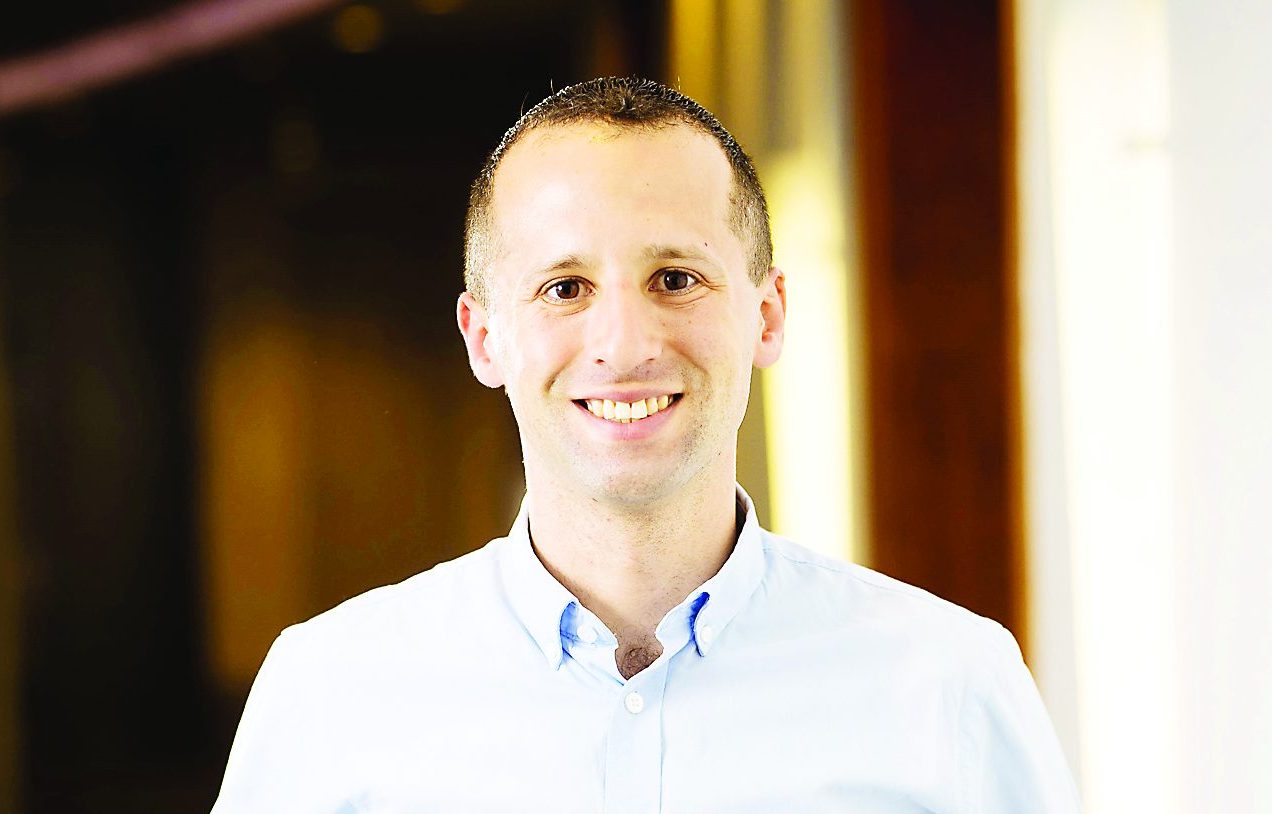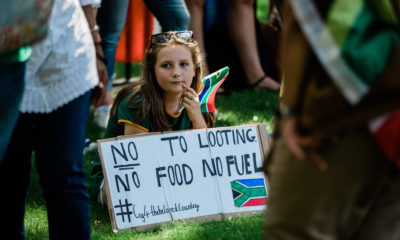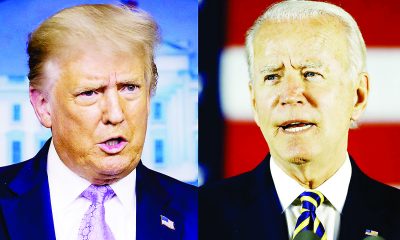
Featured Item

It’s a high-stakes election for US expats
Published
3 years agoon
As America heads towards a historic presidential election in just under a month’s time, American Jewish expats and dual citizens in South Africa feel strongly about the outcome.
“I fear for the long-term impact of a [President] Donald Trump victory on America and the world,” says Professor Adam Mendelsohn, a dual citizen of the United States and South Africa. “There is already much evidence of the erosion of democracy in America.
“Outside America, Trump has been a wrecking-ball, not only undermining America’s traditional allies, but failing to support basic values in the international arena. Some argue that Trump’s support for Israel outweighs all the negatives. For many reasons, I disagree with that position. In all, it will take a long time to roll back the damage that Trump has done to America domestically and internationally.
“Trump has exposed weaknesses within American democracy, and, even if he loses, has shown future political aspirants that a paranoid style of destructive populism works,” Mendelsohn says. “So expect copy-cats, even if he loses. Much like [former President] Jacob Zuma did in South Africa, he has corrupted the functioning of parts of the state. We know how difficult it is to rebuild institutions and trust after they are undermined.
“I’m not sure that antisemitism will get any worse in the United States as Trump has already created an environment where it thrives,” says Mendelsohn. “To me, the bigger concern is what sort of society Jews will live in: an open society built on tolerance and the promise of equality for all [albeit imperfectly delivered], or one built on bullying, division, and ignorance.”
He expects the election to be close and to come down to voters in a handful of states. He and his wife, Dr Andrea Mendelsohn, a native of Boston, will be voting by email – they’ll be sent ballots to fill out and email back.
Madeleine Levy, who lives in Johannesburg, says, “I feel invested in these elections. Even though I live in South Africa, I believe one still feels attached to one’s country of birth and where one grew up.” She won’t vote this year, but if she was to do so, she would vote for Trump.
“The Democrats have gone too far left in their thinking and policies. What’s at stake is keeping the extreme left away from power – that would be a disaster,” she says.
“South African Jews already know that Trump has been excellent for Israel. I’m sure they would like that to continue. The recent Israel, United Arab Emirates (UAE), and Bahrain peace deal looks like the beginning of change in the Middle East.”
She thinks Trump will win, “but it could be close”. She says a lot of family members in the US see the situation very differently from her, and will most probably vote Democrat. “Jews historically – including my immediate family – voted Democrat. That changed with the Clintons and Barack Obama.
“Obama was one of the worst presidents for Israel. I don’t think we can trust the Democrats with achieving anything for Israel except for repeating more or less what Obama did.”
In her view, “The world today needs a strong leader who can stand up for what’s right. Getting rid of the Iran deal and standing up to a Europe that fully supported it took great courage. We have seen that with the NATO [North Atlantic Treaty Organization] countries, and with standing up to China as well. There are many examples of Trump’s decisive leadership, and I believe he is capable of leading the US for another four years.”
Dan Brotman has lived in South Africa for many years, but still feels invested in the US election.
“The US is one of only two countries in the world [Eritrea being the second] that taxes its citizens worldwide regardless of their country of residence. As a native Bostonian, I wholeheartedly subscribe to the political slogan from the 1700s, ‘No taxation without representation’, and so I vote, even though I haven’t really lived in the US since I was a teenager,” he says.
“In addition, my entire immediate family lives in the US, as do many of my close friends, so even though I don’t live there, its political future has an impact on people who are close to me. I’m also deeply pained by what I see happening in the US right now in terms of inexcusable inequality, the handling of COVID-19, political and social divisions, racial injustice, and the treatment of immigrants.
“This election will determine whether we see a further decline in what the US has historically stood for. Germany’s Bertelsmann Foundation recently published a report measuring factors such as equitable education, labour-market access, and health. Tragically, for the wealthiest country in the world, the US ranks #36 out of #41. I was taught growing up that if you worked hard in America, you could achieve anything. As a millennial whose generation has experienced two global financial crashes within a decade, and given the US’ individualistic orientation and limited social safety net, the system isn’t working anymore,” says Brotman.
“I don’t yet know what the alternative is, but it can’t be the status quo. As summarised in a recent article by Canadian anthropologist Wade Davis, ‘The American cult of the individual denies not just community but the very idea of society. No one owes anything to anyone. All must be prepared to fight for everything: education, shelter, food, medical care. What every prosperous and successful democracy deems to be fundamental rights – universal health care, equal access to quality public education, a social safety net for the weak, elderly, and infirm – America dismisses as socialist indulgences, as so many signs of weakness.’”
Brotman registered as an absentee voter in Tennessee, and he was emailed a ballot a few weeks ago.
“I went to the US consulate in Sandton, and dropped off my absentee ballot. I voted for [Joe] Biden because overall, he is more likely to create a stronger social safety net and is more likely to succeed at beginning to heal societal divisions. However, I don’t discount some of Trump’s foreign policy achievements, such as moving the US embassy to Jerusalem, being tough on China, and brokering a normalisation agreement between Israel, the UAE, and Bahrain.”
To Brotman, “South African Jews should care about these elections first and foremost as South Africans, as the US is South Africa’s third biggest trading partner. A weakened US wouldn’t be good for South Africa’s already extremely vulnerable economy. As Jews, we should care about who becomes the president of Israel’s closest ally, with the potential of making or breaking Israel’s role on the world stage and in the Middle East.”
Furthermore, “A weaker America is ultimately bad for Jews living in all democratic countries, as currently, there is no other superpower that can stand up to authoritarian values. And if the US position on Israel reverts back to what it was under the Obama administration, it could put American Jews in an awkward position in which they feel that they need to choose between declaring loyalty to the US versus Israel, especially if those two countries’ leaders or positions are at odds.”
He believes Trump will win a second term. “The US electoral system is designed around the Electoral College, not the popular vote. This factor, combined with the complications of mail-in voting and people being too scared to go to the polls due to the pandemic, makes me think that Biden has too many odds stacked against him. I watched the recent Republican National Convention, and Trump is able to derive enthusiasm from his voters in a way that Biden simply doesn’t.”
However, “Like the last presidential elections, my liberal coastal friends are confident that Biden will win, just as they were confident that Hillary [Clinton] would win. When it comes to US elections, and due to the complexity of the electoral system, one can never be too confident about the outcome.
“What I want to see change in the US is a realignment of values away from pure individual responsibility, and more towards societal responsibility for one another,” says Brotman. “We will have future pandemics, and just wait until the ice caps melt! We need a society where people’s most basic needs are looked after by the government, especially in situations when they lose everything for reasons that are no fault of their own. Neither Biden nor Trump will ultimately be able to realign these values alone, it has to come from within the American people.”










